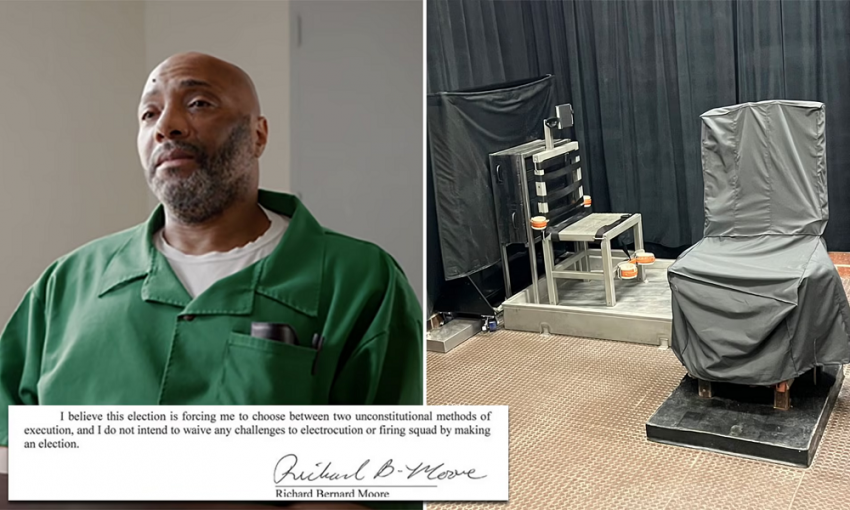Richard Bernard Moore is one of the names that, through his crimes, earned much publicity across South Carolina after being charged with committing a serious crime relating to murder through robbery in the year 1999 and has been at the centre of numerous court cases as well as public debates relating to capital punishment and change in the criminal justice system in America. His case is widely discussed in the media and forums of law, involving diverse complex legal issues that vary from capital punishment, through sentencing appeals to the situation of prison conditions.
South Carolina executed Richard Moore on Friday for the 1999 shooting death of a convenience store clerk.
Moore, 59, was executed by lethal injection and pronounced dead at 6:24 p.m. ET after making a number of unsuccessful arguments to Republican Gov. Henry McMaster and the U.S. Supreme Court, among others. He was the last Black man on South Carolina’s death row to be convicted and sentenced by an all-white jury, according to his attorney.
Not only does the death sentence imposed by an all-white jury raise serious questions about whether Moore got a fair shake in South Carolina’s court system, his attorney argues that Moore was unarmed when he walked into the convenience store and wasn’t even there to rob it.
In this article, delve deep into Richard Bernard Moore background, family, case that brought him national attention, and the discussions related to his fate.
Background and Early Life
Richard Bernard Moore was a South Carolina native. While not much can be said openly about his early life, Moore’s past, like those of most individuals in the criminal justice system, might include economic disadvantage and limited opportunities for education. Understanding his personal history and upbringing may give some insight into the circumstances that led him into later life choices and crime that led to imprisonment.
The Incident and Conviction
In September 1999, Richard Bernard Moore was involved in an attempted robbery which resulted in the fatal murder of a clerk in a convenience store. The crime started as snatching cash and products but ended in death; Moore was consequently apprehended, arraigned, and, after trial, convicted of murder and sentenced by the court in 2001. During a submission to the court, prosecutors alleged that Moore intentionally committed this crime and, in turn, found him guilty of the crime in question.
Since then, public interest and debate over his case have been ongoing. Over the years, several appeals have been filed on his behalf, arguing against the justness of his sentencing and some other possible flaws in the process that led to his conviction.
Legal Battles and Death Penalty Discussions
The case of Richard Bernard Moore remains widely publicized as this debate continues in South Carolina on the death penalty issue. For several years now, his lawyers have always been trying to appeal his capital punishment based on issues involving the unfairness at his trial, procedural mistakes he experienced, and his background which was not considered clearly in the sentencing process.
One of the most significant legal issues in the case of Moore is the options the state of South Carolina can take in carrying out the death penalty. The state recently introduced alternative execution methods, such as the firing squad, due to shortages of lethal injection drugs. Moore was presented with the choice between these options, which sparked media and public interest worldwide. This bizarre situation has stirred up the debates about the morality, ethics, and feasibility of capital punishment, especially when the preferred methods of execution are not available.

Family and Personal Life
Richard Bernard Moore’s family, though generally keeping out of the limelight, has been affected by his long imprisonment and the spotlight his case has brought upon him. They must have faced public condemnation, not to mention their personal agony at Richard Bernard Moore case. Families of prisoners face all this emotional strain at having a loved one to possibly be executed plus the stigma attached to it.
Both families-the victim and the convict are equally under great pressure. The family must have experienced mixed emotions in terms of sadness and frustration with the legal system regarding his ultimate fate. On the side of the victims, this family too would have endured the anguish of losing their loved one as well as had to follow the twists and turns in the court for all these years. Cases like Moore serve as reminders of the destructive power of violent crime on all levels and the extensive legal procedure for both families.
This lengthy history by Richard Moore Execution has become the background on which reform need should be discussed for criminal law and, particularly in his case, capital punishment practices. Many argue that one of the punishments inflicted to prisoners on death rows indeed amounts to mental anguish-that is, lengthy confinements in prison-under their sentences. Therefore, proponents lead some people towards clamoring for abolition and its reforms. South Carolina is not one of the many states that is being asked why it appears to take so long for death row inmates to die.
Richard Bernard Moore case, again, also zeroes in on socioeconomic factors that significantly influence criminal behavior and sentencing. Many proponents of criminal justice reform argue that this population is disproportionately represented in death penalty cases and illustrates a greater systemic problem.
The case of Richard Bernard Moore typifies many problems associated with the death penalty and the American justice system. It’s not just about the crime and its consequences but has larger issues connected to the ethos of legality, influence from socio-economic factors, and psychological aspects on family relationships. While his fate will still be in the hands of the law, this case continues to evoke such strong reactions and contribute to the ongoing debate about capital punishment in America.
For those interested in tracking the case or learning more, there are reputable news sources and criminal justice reform organizations that often provide information on cases such as Richard Bernard Moore. As society continues to change, so do conversations around justice, punishment, and mercy, which can inform policies affecting individuals, families, and communities all over the country.



